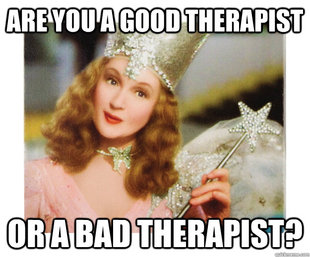Besides which, there's a huge stigma factor.
When we hear that someone has been "in therapy" for an extended period of time, our initial reaction is not, "Oh, what a brave and courageous person. Kudos to her/him for facing her/his issues head on and getting the help s/he needs." It's more along the lines of, "Wow, that person must be really f---ed up."Am I right?
I am ashamed to admit, I tend to think that way - and I know better! I've had long term counseling myself, and I'd do it again tomorrow.
Sometimes people get stuck in a rut, whether that rut is grief, PTSD, or choosing bad relationships. If our car is stuck in a rut, would we feel ashamed or embarrassed to need a little push getting out of the ditch? (Okay, maybe a little embarrassed, depending on how we got into that ditch.)
But if we'd been in a car accident, and needed physical therapy to recover the use of, say, an arm, wouldn't we commit to it for as long as it took to get the maximum use of our arm back?
Yes, there are personality clashes, and sometimes, despite any number of impressive degrees, we may have hit on a "bad" therapist, but mostly, therapy fails because:
- We aren't seeing the right kind of therapist.
- We aren't getting the right kind of therapy.
- We aren't committed to the very hard emotional homework of being honest with our therapist, and working on the exercises or changes s/he suggests.
- Psychotherapist
- Psychologist
- School Psychologist
- Psychiatrist
- Mental Health Counselor
- Marriage & Family
- Social Worker
- Psychiatric Nurse
- Pastoral Counselor
Because someone is "lower on the food chain," does not necessarily mean he or she will be an ineffective therapist. For some problems and disorders, medication is not indicated. For others it may be helpful on a short-term basis in conjunction with CBT or other brain retraining exercises; and for some people, long-term medication may be necessary. In yet others inpatient care may be required. A nutritionist may add needed support.
A good therapist will recognize when a client needs more help than s/he can provide, and be eager to steer her/his client to the right kinds of additional help.
Different types of therapy include:
- Psychoanalysis
- Cognitive Behavior Therapy (CBT)
- Dialectic Behavior Therapy (DBT)
- Antipsychotic and/or antidepressant medications, and/or mood stabilizers
A treatment once promoted, which fell into some disrepute, and now gaining some proponents is ECT (Electroshock Therapy) as a treatment for bipolar disorder and depression. Diet modification, music therapy, group therapy, yoga and mindfulness exercises; all can form an integral part of helping a person become as whole and mentally healthy as possible.
The most important factor in therapy success is being committed to it. If we are not willing to embrace the process and say, "Yes, this area of my life is causing me and my loved ones too much pain. I will do whatever it takes to make it better for everyone I love - including me," then no matter how experienced and skilled the therapist, no matter how effective the treatment, it's not going to work.
Changing lifelong behaviors and thinking patterns is hard, hard work. In an earlier post, I compared it to shifting the course of the river - the river tries to flow along the same channels it always has. This is where medication in partnership with therapy often works well, interrupting the old patterns long enough for new ones to form (they say about 90+ days is the minimum time frame to quit an old habit or form a new one).
I know people who are diagnosed as mentally ill who religiously follow their medication, exercise, diet, and therapy regimes. I know others diagnosed as mentally ill who are willing to try certain therapies but not others. I know some who refuse to see any kind of counselor, under any circumstances, even if it means being fired from a job or losing a spouse or partner, using the excuse of, "I saw a therapist once, and it didn't help." They believe all it takes is willpower and determination to not be disordered.
Guess which group is most successful at managing their condition?
My A-Z theme is Issues related to Mental Health or Mental Illness.
Have you ever had good or bad therapy?
Would you be willing to try it again?
Why or why not?

